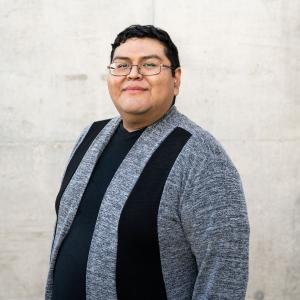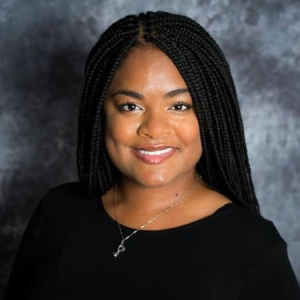
These inaugural Presidential Graduate Assistantship graduates bring art to the real world
As a community of scholars, we are proud to celebrate the academic accomplishments of our fellow graduate students. Today, we focus on two recently graduated PhD students from the Herberger Institute of Design and Arts who are also the first Presidential Graduate Assistants to graduate. Their unique contributions to their respective fields of study have earned them recognition within the academic community.
In this article, we explore their journey as graduate students, their research interests, and the impact of their work on society. Through a Q&A style interview, we gain insight into the challenges and successes of their academic pursuits. We hope these conversations inspire and motivate you to pursue your passions and make meaningful contributions to your fields of study. Congratulations, grads!
Theo Beatty
Please introduce yourself and tell us about your academic and professional background.
My name is Theo Beatty. I am an alumnus of ASU, class of 2018, where I received my bachelor's degree in fine arts with a concentration in drawing. I also have an associate’s degree in fine arts from Paradise Valley Community College. This spring, I will receive my Master's in Fine Arts from the School of Art at the Herberger Institute of Design and the Arts.
How did you become involved in the arts? What inspired you?
I have always been interested in art and making since I was a child. My paternal grandmother was a traditional ceramicist who strongly encouraged me to continue to make work, and I grew up around many artists in my community. I didn’t take art-making too seriously until I was at Paradise Valley Community College, where I recognized it as a passion rather than a hobby or side activity. I have been earnestly making art since. I am primarily influenced by my tribal teachings, Hopi, and life on and off the reservation.
What types of problems do you work on within the arts? Why do you think they are important?
My work seeks to show resilience and continuance of tradition with the advancement of technology through the traditional framework of Hopi design and Western understandings of art. This work is important because it dispels the assumptions held by people who haven’t interacted with indigenous people. It places us as functioning societies within the greater society where we face the same problems as everyone else and seek to continue our existence.
I don’t believe that I have attended any funding opportunities. Still, I am always glad to know that anything we receive will be used to improve the student experience and their chances of success. Being a student twice over at ASU and within the same institution has helped me develop a sense of pride for my college, and I hope its successes are numerous.
Please tell us about your experience as a Presidential Graduate Assistant. How has it helped you, or how do you hope it will help you as it relates to your long-term career goals?
Being a Presidential Graduate Assistant has been an amazing experience and opportunity. I have had the opportunity to meet many people out of my program who I don’t think I would have ever had the chance to otherwise. It has helped me expand my worldview and consider the next steps in my life, not just career goals or opportunities.
Crestcencia Ortiz-Barnett
Please introduce yourself and tell us about your academic and professional background.
My name is Crestcencia Ortiz-Barnett, and I'm a Presidential Graduate Assistant from southwest Detroit, Michigan. I've been living here for a year and a half; I moved here to attend ASU. Previously, I lived in Japan. My husband just retired from the Air Force, and we were there for five years. My interests are theatre, movies and anything that allows me to use my creativity. I love to read, and I'm a homebody. My true passion is creating opportunities for others.
How did you become involved in the arts? What inspired you?
For me, theatre started at an after-school prevention program. I learned how to write and direct skits and it was an escape from my life. I got to create any narrative I dreamed up. I've always been a shy person: I get anxious when joining groups and anyone who knows me, knows that I don’t like speaking in public and rather be behind the scenes. But, theatre is a way for me to show who I really am and allows me to speak from my heart.
Also, having a foundation in Black theatre has changed my perspective on life; attending an HBCU in my undergraduate years structured my life and allowed me to see things differently. It taught me how to navigate a difficult world and I could learn in a space where I wasn't the minority and I could focus on my education. That experience was imperative in my academic and personal career. I understand that fact a lot more now as I try to help my daughter navigate a Primarily White Institution (PWI) where she is constantly dealing with microaggressions and racism. I believe that these problems exist because of a lack of representation in the field, classrooms and media, etc.
What types of problems do you work on within the arts? Why do you think they are important?
My foundation in Black theatre allows me to see the gaps in telling, creating and producing stories and those of other marginalized communities, when at predominantly white institutions. Research shows that the majority of Black students in theatre did not have a strong theatre background growing up due to many obstacles, one important being finances. This fact led many of these theatre students to feel a lack of belongingness in the westernized theatre world because they don’t speak the lingo or know all the “theatre terms.” I’m trying to close this gap by being a resource (teaching, directing, creating) and working on bringing opportunities to students to enact and take part in performances that celebrate and teach the Black lived experience. I also strive to show them that there are hundreds of methods to theatre, especially when pertaining to Black theatre.
Additionally, I've been working at helping students overcome impostor syndrome because I am familiar with it and understand how proper support can have a positive impact on how persistent a person can be in college. I believe a sense of belonging is important for wellbeing and the persistence that leads to graduation. If you don't have a community or a sense of belonging, you might consider dropping out. I see these problems or gaps and I'm doing my best to shorten them but I'm still a student, so my support only goes so far. Fortunately, my department has put initiatives in place to support our demographic and to make sure that we are included.
Are there any events, initiatives or funding opportunities at the Graduate College that you’re excited about?
As a Presidential Graduate Assistant, I try to attend every event at the Graduate College because I want to show appreciation for the program and give back by introducing myself to the newcomers and being available to them. Each event keeps getting better and there is so much that I learn from each one!
Learn more about the Presidential Graduate Assistantship Program
More stories from the Graduate Insider

Inside Graduate College’s Three Minute Thesis competition
When Aliyah Egan stepped onto the stage as a master’s student in last year’s Graduate College Three Minute Thesis (3MT) competition, she faced a challenge familiar to many researchers: explaining complex, specialized work to an audience with little or no background in her field.

Mentoring with intention: Strengthening graduate support at ASU
January is National Mentoring Month, a time to celebrate the impact mentoring can have and to reflect honestly on where gaps remain. At Arizona State University, mentoring is recognized as a critical component of graduate student success.

Graduate education is an adventure
About eighteen months ago, I set out on a journey walking the islands of the Dodecanese during a sailing trip in Türkiye and Greece with several friends. Along the way, I found winding paths, timeless villages and breathtaking views of sea and sky. That experience got me thinking about how adventure shows up in other parts of life, especially in learning.

